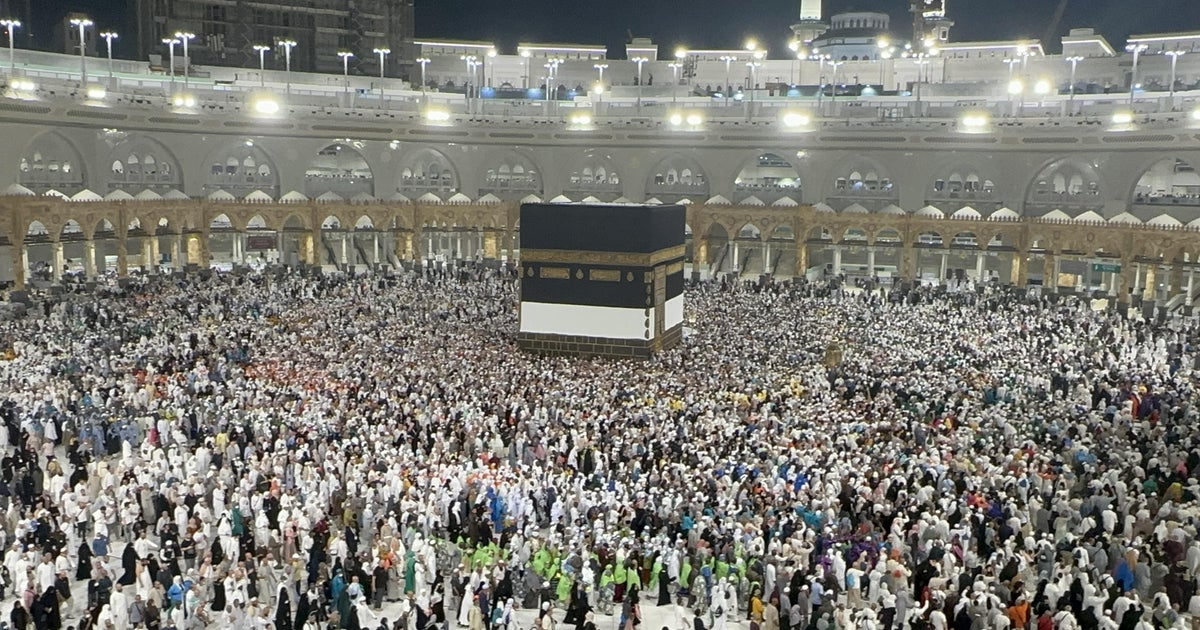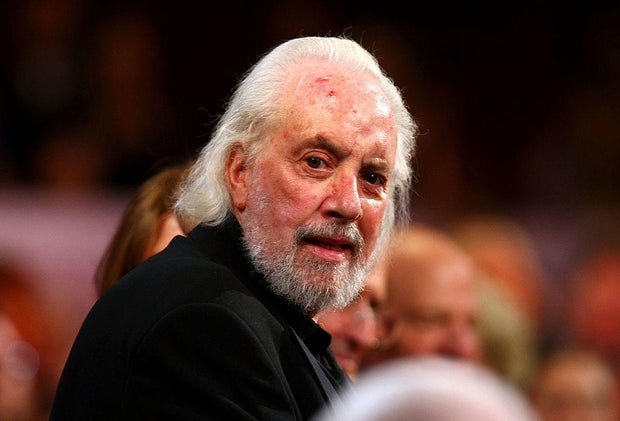CBS News
Death toll at Hajj pilgrimage rises to 1,300 amid extreme high temperatures

More than 1,300 people died during this year’s Hajj pilgrimage in Saudi Arabia as the faithful faced extreme high temperatures at Islamic holy sites in the desert kingdom, Saudi authorities announced Sunday.
Saudi Health Minister Fahd bin Abdurrahman Al-Jalajel said that 83% of the 1,301 fatalities were unauthorized pilgrims who walked long distances in soaring temperatures to perform the Hajj rituals in and around the holy city of Mecca.
Speaking to state-owned television, the minister said 95 pilgrims were being treated in hospitals, some of whom were airlifted for treatment in the capital, Riyadh. He said the identification process was delayed because there were no identification documents with many of the dead pilgrims.
The fatalities included more than 660 Egyptians. All but 31 of them were unauthorized pilgrims, according to two officials in Cairo. Egypt has revoked the licenses of 16 travel agencies that helped unauthorized pilgrims travel to Saudi Arabia, authorities said.
The officials, who spoke on condition of anonymity because they were not authorized to brief journalists, said most of the dead were reported at the Emergency Complex in Mecca’s Al-Muaisem neighborhood. Egypt sent more than 50,000 authorized pilgrims to Saudi Arabia this year.
Issam Rimawi/Anadolu via Getty Images
Saudi authorities cracked down on unauthorized pilgrims, expelling tens of thousands of people. But many, mostly Egyptians, managed to reach holy sites in and around Mecca, some on foot. Unlike authorized pilgrims, they had no hotels to return to to escape the scorching heat.
In a statement Saturday, Egypt’s government said the 16 travel agencies failed to provide adequate services for pilgrims. It said these agencies illegally facilitated the travel of pilgrims to Saudi Arabia using visas that don’t allow holders to travel to Mecca.
The government also said officials from the companies have been referred to the public prosecutor for investigation.
According to the state-owned Al-Ahram daily, some travel agencies and Hajj trip operators sold Saudi tourist visas to Egyptian Hajj hopefuls, violating Saudi regulations which require exclusive visas for pilgrims. Those agencies left pilgrims in limbo in Mecca and the holy sites in scorching heat, the newspaper said.
The fatalities also included 165 pilgrims from Indonesia, 98 from India and dozens more from Jordan, Tunisia, Morocco, Algeria and Malaysia, according to an Associated Press tally. Two U.S. citizens were also reported dead.
The AP could not independently confirm the causes of death, but some countries like Jordan and Tunisia blamed the soaring heat. AP journalists saw pilgrims fainting from the scorching heat, especially on the second and third days of the Hajj. Some vomited and collapsed.
Historically, deaths are not uncommon at the Hajj, which has seen at times over 2 million people travel to Saudi Arabia for a five-day pilgrimage. The pilgrimage’s history has also seen deadly stampedes and epidemics.
But this year’s tally was unusually high, suggesting exceptional circumstances.
AFP via Getty Images
In 2015 a stampede in Mina killed over 2,400 pilgrims, the deadliest incident ever to strike the pilgrimage, according to an AP count. Saudi Arabia has never acknowledged the full toll of the stampede. A separate crane collapse at Mecca’s Grand Mosque earlier the same year killed 111.
The second-deadliest incident at the Hajj was a 1990 stampede that killed 1,426 people.
During this year’s Hajj period, daily high temperatures ranged between 46 degrees Celsius (117 degrees Fahrenheit) and 49 degrees Celsius (120 degrees Fahrenheit) in Mecca and sacred sites in and around the city, according to the Saudi National Center for Meteorology. Some people fainted while trying to perform the symbolic stoning of the devil.
The Hajj, one of the five pillars of Islam, is one of the world’s largest religious gatherings. More than 1.83 million Muslims performed the Hajj in 2024, including more than 1.6 million from 22 countries, and around 222,000 Saudi citizens and residents, according to the Saudi Hajj authorities.
Saudi Arabia has spent billions of dollars on crowd control and safety measures for those attending the annual five-day pilgrimage, but the sheer number of participants makes it difficult to ensure their safety.
Climate change could make the risk even greater. A 2019 study by experts at the Massachusetts Institute of Technology found that even if the world succeeds in mitigating the worst effects of climate change, the Hajj would be held in temperatures exceeding an “extreme danger threshold” from 2047 to 2052, and from 2079 to 2086.
Islam follows a lunar calendar, so the Hajj comes around 11 days earlier each year. By 2029, the Hajj will occur in April, and for several years after that it will fall in the winter, when temperatures are milder.
CBS News
7/2: CBS Evening News – CBS News

Watch CBS News
Be the first to know
Get browser notifications for breaking news, live events, and exclusive reporting.
CBS News
Robert Towne, legendary Hollywood screenwriter of “Chinatown,” dies at 89

Robert Towne, the Oscar-winning screenplay writer of “Shampoo,” “The Last Detail” and other acclaimed films whose work on “Chinatown” became a model of the art form and helped define the jaded allure of his native Los Angeles, has died. He was 89.
Towne “passed away peacefully surrounded by his loving family” Monday at his home in Los Angeles, his publicist Carri McClure, told CBS News in a statement. She did not provide a cause of death.
In an industry which gave birth to rueful jokes about the writer’s status, Towne for a time held prestige comparable to the actors and directors he worked with. Through his friendships with two of the biggest stars of the 1960s and ’70s, Warren Beatty and Jack Nicholson, he wrote or co-wrote some of the signature films of an era when artists held an unusual level of creative control. The rare “auteur” among screen writers, Towne managed to bring a highly personal and influential vision of Los Angeles onto the screen.
Alberto E. Rodriguez/Getty Images for AFI
“It’s a city that’s so illusory,” Towne told The Associated Press in a 2006 interview. “It’s the westernmost west of America. It’s a sort of place of last resort. It’s a place where, in a word, people go to make their dreams come true. And they’re forever disappointed.”
Recognizable around Hollywood for his high forehead and full beard, Towne won an Academy Award for “Chinatown” and was nominated three other times, for “The Last Detail,” “Shampoo” and “Greystoke.” In 1997, he received a lifetime achievement award from the Writers Guild of America.
“His life, like the characters he created, was incisive, iconoclastic and entirely (original),” said “Shampoo” actor Lee Grant on X.
Towne was born Robert Bertram Schwartz in Los Angeles and moved to San Pedro after his father’s business, a dress shop, closed down because of the Great Depression. His father changed the family name to Towne.
Towne’s success came after a long stretch of working in television, including “The Man from U.N.C.L.E” and “The Lloyd Bridges Show,” and on low-budget movies for “B” producer Roger Corman. In a classic show business story, he owed his breakthrough in part to his psychiatrist, through whom he met Beatty, a fellow patient. As Beatty worked on “Bonnie and Clyde,” he brought in Towne for revisions of the Robert Benton-David Newman script and had him on the set while the movie was filmed in Texas.
Towne’s contributions were uncredited for “Bonnie and Clyde,” the landmark crime film released in 1967, and for years he was a favorite ghost writer. He helped out on “The Godfather,” “The Parallax View” and “Heaven Can Wait” among others and referred to himself as a “relief pitcher who could come in for an inning, not pitch the whole game.” But Towne was credited by name for Nicholson’s macho “The Last Detail” and Beatty’s sex comedy “Shampoo” and was immortalized by “Chinatown,” the 1974 thriller set during the Great Depression.
“Chinatown” was directed by Roman Polanski and starred Nicholson as J.J. “Jake” Gittes, a private detective asked to follow the husband of Evelyn Mulwray (played by Faye Dunaway). The husband is chief engineer of the Los Angeles Department of Water and Power and Gittes finds himself caught in a chaotic spiral of corruption and violence, embodied by Evelyn’s ruthless father, Noah Cross (John Huston).
Influenced by the fiction of Raymond Chandler, Towne resurrected the menace and mood of a classic Los Angeles film noir, but cast Gittes’ labyrinthine odyssey across a grander and more insidious portrait of Southern California. Clues accumulate into a timeless detective tale, and lead helplessly to tragedy, summed up by one of the most repeated lines in movie history, words of grim fatalism a devastated Gittes receives from his partner Lawrence Walsh (Joe Mantell): “Forget it, Jake, it’s Chinatown.”
The back story of “Chinatown” has itself become a kind of detective story, explored in producer Robert Evans’ memoir, “The Kid Stays in the Picture”; in Peter Biskind’s “East Riders, Raging Bulls,” a history of 1960s-1970s Hollywood, and in Sam Wasson’s “The Big Goodbye,” dedicated entirely to “Chinatown.” In “The Big Goodbye,” published in 2020, Wasson alleged that Towne was helped extensively by a ghost writer — former college roommate Edward Taylor. According to “The Big Goodbye,” for which Towne declined to be interviewed, Taylor did not ask for credit on the film because his “friendship with Robert” mattered more.
The studios assumed more power after the mid-1970s and Towne’s standing declined. His own efforts at directing, including “Personal Best” and “Tequila Sunrise,” had mixed results. “The Two Jakes,” the long-awaited sequel to “Chinatown,” was a commercial and critical disappointment when released in 1990 and led to a temporary estrangement between Towne and Nicholson.
Around the same time, he agreed to work on a movie far removed from the art-house aspirations of the ’70s, the Don Simpson-Jerry Bruckheimer production “Days of Thunder,” starring Tom Cruise as a race car driver and Robert Duvall as his crew chief. The 1990 movie was famously over budget and mostly panned, although its admirers include Quentin Tarantino and countless racing fans. And Towne’s script popularized an expression used by Duvall after Cruise complains another car slammed him: “He didn’t slam into you, he didn’t bump you, he didn’t nudge you. He rubbed you.
“And rubbin,′ son, is racin.'”
Towne later worked with Cruise on “The Firm” and the first two “Mission: Impossible” movies. His most recent film was “Ask the Dust,” a Los Angeles story he wrote and directed that came out in 2006. Towne was married twice, the second time to Luisa Gaule, and had two children. His brother, Roger Towne, also wrote screenplays, his credits include “The Natural.”
CBS News
Analyzing impact of Supreme Court’s Trump immunity decision

Watch CBS News
Be the first to know
Get browser notifications for breaking news, live events, and exclusive reporting.










